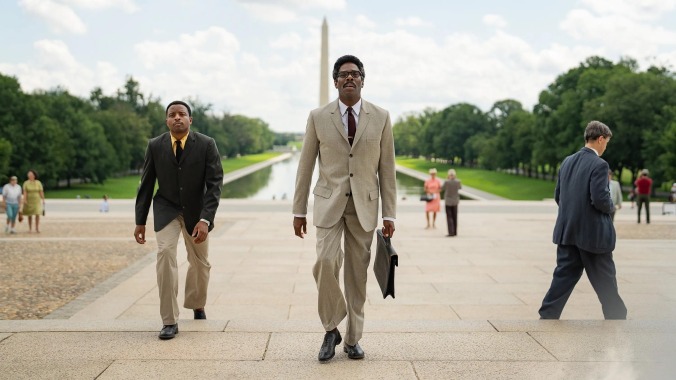Rustin review: Justice is mostly served for a forgotten civil rights leader
Colman Domingo delivers a commanding performance, alongside Chris Rock and Jeffrey Wright, as overlooked civil rights leader Bayard Rustin

Bayard Rustin is not a household name in the same way that Martin Luther King, Jr. or John Lewis are in regards to the civil rights movement, though given the man’s contributions, he certainly should be. Credited with introducing Dr. King to the concept of non-violent resistance and for orchestrating the 1963 March on Washington, Rustin was a force within a movement that was nevertheless wary of him for his past Communist ties and unapologetic homosexuality, which made him a pariah among Black leaders seeking respectability for their movement. It’s no wonder, then, that writers Julian Breece (When They See Us) and Dustin Lance Black (Milk), and director George C. Wolfe (Ma Rainey’s Black Bottom), would wish to bring a story like Rustin to life. But as much as they succeed, there’s also a lingering sense that their examination better serves the man’s accomplishments than the man himself.
Colman Domingo portrays Rustin with eccentric bombast, a firecracker wit, and a tender longing that is extremely entertaining. After a prologue in which Dr. King refuses to stand up for Rustin’s continued involvement in the movement, leading to a rift between them, the film jumps ahead to 1963 when the ostracized Rustin ignites the grassroots effort to bring the largest peaceful protest in history to Washington, an event that would reunite him with King for the “I Have a Dream” speech.
The film shines brightest when it’s in frantic mode, its jazz soundtrack blaring as Andrew Mondshein’s occasionally overwound editing makes the act of arranging transportation, food, water, and financing for hundreds of thousands of people in a mere eight weeks into a spectacle. As a demonstration of the collective effort it takes to pull off such an event, the film effectively communicates Rustin’s leadership genius, as well as the hostility he faced from his supposed allies in the NAACP and from other Black leaders.
These performances of historical figures are a mixed bag in terms of quality, with CCH Pounder and Jeffrey Wright coming across especially well as Dr. Anna Hedgeman and Rep. Adam Clayton Powell, Jr., respectively. Meanwhile, Chris Rock fails to summon much acting acumen to differentiate NAACP executive secretary Roy Wilkins from, well, Chris Rock. However, the arguments and prejudices that define these characters make for compelling obstacles, and Rustin is more than happy to oblige in the catharsis of overcoming establishment forces in spite of such in-fighting.








































